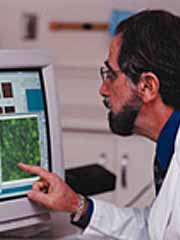Edward R. Block, M.D.
Professor of Medicine
College of Medicine
2000 Awardee
 Edward R. Block has had a long-standing interest in the blood vessels of the lung, and how lung injury and/or disease affect the function of these blood vessels. To study this, Block and his colleagues use a compendium of scientific approaches including biochemical methods, cell biology techniques and the tools of molecular biology.
Edward R. Block has had a long-standing interest in the blood vessels of the lung, and how lung injury and/or disease affect the function of these blood vessels. To study this, Block and his colleagues use a compendium of scientific approaches including biochemical methods, cell biology techniques and the tools of molecular biology.The lung is an organ that is absolutely vital to survival. It delivers oxygen from the air to the blood that circulates throughout all parts of the body. Without adequate oxygen delivery, body tissues die.
To achieve its function, the lung has two major anatomic units: the airways that deliver the oxygen-containing air to the air sacs in contact with the blood; and the blood vessels that are in intimate contact with the air sacs and into which the oxygen is transported for delivery to the rest of the body. Both units are essential.
Block’s current studies focus on how lung disease and reduced amounts of oxygen affect the production of nitric oxide (NO) by blood vessels in the lung. NO, a simple but remarkable molecule that is made by certain cells in the blood vessels of the lung, is responsible for keeping lung blood vessels open in order to allow blood to contact the air sacs where oxygen is transferred to the blood. A better understanding of what regulates blood flow in the lung will allow Block’s team to design treatment strategies for diseases such as emphysema and shock that affect the lung’s blood vessels and interfere with delivery of oxygen to body tissues.
Block, who also serves as Systems Chief of the Research Service at the Malcom Randall VA Medical Center, has been continuously supported by the National Heart, Lung and Blood Institute since 1976 and was recently selected to receive a prestigious Method to Extend Research In Time (MERIT) award from the institute. MERIT awards are given to investigators who have demonstrated superior competence and outstanding productivity during their previous research endeavors in areas related to heart, lung, or blood research and who are likely to continue to perform in an outstanding manner in the future. Block also served as the 1998-99 president of the American Thoracic Society, the largest and most prestigious professional scientific society for scientists and clinicians interested in pulmonary and critical care medicine.

